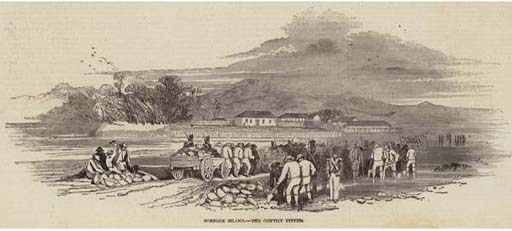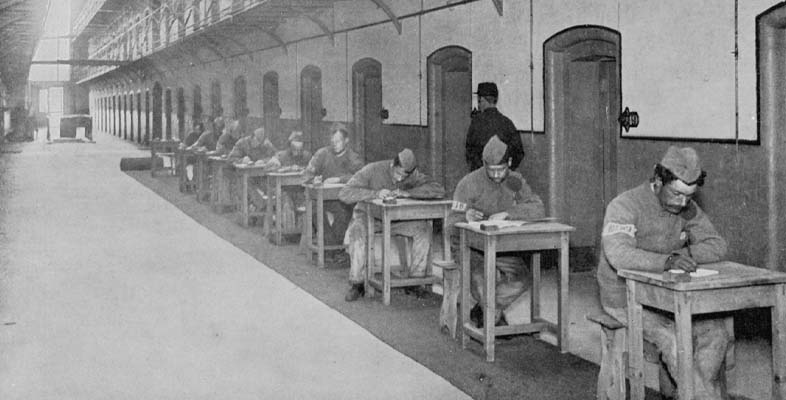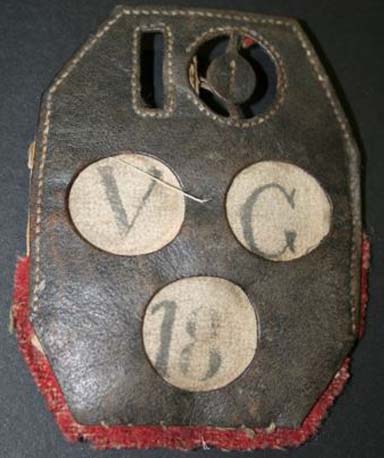4 Incentives for learning
In Britain, the introduction of sentences of penal servitude in 1853 was accompanied by a system of rewards and privileges which were given to convicts who behaved well and worked hard. Before 1857, these incentives were the only way of encouraging compliance and good conduct across long sentences in the absence of remission (a reduction of the time spent in prison). After 1857, the system provided a mechanism for withholding release on licence – a third stage of penal servitude whereby a portion of the original sentence was served outside of prison – from those who misbehaved.
In Ireland, convicts had to earn a certain number of ‘marks’ in order to claim remission. A convict could earn up to 9 marks each month. These were awarded for: discipline (for their regularity and good behaviour); school (for their attention and diligence, not progress); and industry (for their effort at work).
Box 2 Notes on Figure 4
From 1853, the second stage of penal servitude or transportation – associated labour on public works – was sub-divided into a further three stages, the lowest of which was divided into three classes. Convicts advanced through these classes and stages, and received gratuities, badges and other indulgences, according to their conduct and industry. Those who behaved badly, or who were not industrious, could be demoted.
Their progress was recorded in a book, but, in order to impress upon them the fact that they were always under assessment, additions were made to their uniforms (McConville, 1981, p. 401). Rings were worn by convicts on their left arms to indicate the stage they had reached. Good conduct badges, made of leather with an edge of red cloth, were worn by those who had achieved them on their right arms. The top number displayed the length of their sentence – in this example, 10 years. The number at the bottom showed how many months had been completed at the prison. The disks in the middle summarised the convict’s conduct – in this case, the convict had been ‘very good’ (V. G.) for his whole 18 months at the prison. Other possible grades included ‘good’ (G) and ‘ordinary’ (O).
The 1863 Royal Commission on Penal Servitude expressed concern about the system of rewards and privileges in British convict prisons. In particular, they objected to the assumption that convicts were entitled to remission: they lost it only if they misbehaved, and even then they could earn it back again. The Irish marks system provided an attractive alternative, though the Commissioners rejected the practice of awarding marks for diligence at school. They also thought that good conduct should be expected and not rewarded.
Following the Commissioner’s recommendations, in July 1864 a new system of classification based on the awarding of marks was introduced into British male convict prisons (there was no change for Irish prisons). Convicts in their second stage of a penal servitude sentence were divided into five classes: probation, third, second, first and special. Promotion through these classes depended on the number of marks they earned for the labour they performed each day. As convicts progressed through the classes, gratuities (small sums of money given for labour performed) and indulgences increased. Those who earned the maximum number of marks became eligible for release on licence after serving three-quarters of their sentence (McConville, 1981, p. 404).

Activity 3 The marks system in British convict prisons
Have a look at these extracts from Standing Orders 145 and 146 sent to prison governors on 22 July 1864. Standing Order 145 outlined the new system of classification in British convict prisons. Standing Order 146 contained regulations for the awarding of marks. Quite a few of the clauses have been included in each to give you a sense of what the authorities were trying to achieve.
- Can you find clauses which relate to education? How is education being used to regulate promotion between classes and the allocation of privileges and marks?
- How did this differ from the Irish system described above?
[Standing Order] No. 145
22nd July 1864.
SYSTEM OF CLASSIFICATION to be adopted for all CONVICTS received into the PUBLIC WORKS PRISONS on and after the 12th July 1864.
- All stages and classes, as now existing, to be prospectively abolished for all convicts hereafter received into public works prisons.
- A convict during the term of his imprisonment will be required to pass through the following classes, viz.: -
- Probation Class, 1 year, during which they must earn on public works 720 marks
- 3rd Class, 1 year, during which they must earn on public works 2,920 marks
- 2nd Class, 1 year, during which they must earn 2,920 marks
- After which they will be eligible for promotion to the 1st Class.
- Every convict is thus required to remain in the Probation Class for a minimum period of 1 year, reckoned from the date of conviction, of which 9 months will be passed in separate confinement.
- If his conduct and industry are good he will then be promoted to the 3rd Class, and so on to the 2nd, remaining in each a minimum period of 1 year
[…]
- Prisoners in the 3rd Class will wear the ordinary grey convicts’ dress with black facings.
- They will be allowed:-
- 1st. To receive a gratuity of 12s. being at the rate of 1s. per month for 12 months, to be earned by marks during the time spend in this class, and if their conduct shows that they deserve it.
- 2nd. To receive a visit of 20 minutes duration, once in six months, at such time as the Governor approves, care being taken that the stipulated number is not exceeded, and both to receive and write a letter once in six months, provided their conduct in that class has been good for at least two previous consecutive months.
- 3rd. They will be allowed one period of exercise during Sundays.
- Prisoners in the 2nd Class will wear the ordinary grey convicts’ dress with yellow facings.
- They will be allowed:-
- 1st. To receive a visit of 20 minutes’ duration, and both to receive and write a letter once in four months.
- 2nd. To receive a gratuity of 18s calculated at 1s 6d., per month for 12 months, to be earned by marks during the time spent in this class, and if their conduct shows that they deserve it.
- 3rd. To be allowed choice of tea and 2 oz. of additional bread instead of gruel.
- 4th. To have two periods of exercise during Sundays.
- Prisoners in the 1st class will wear the ordinary grey convicts’ dress with blue facings.
- They will be allowed:-
- 1st. To receive a visit of half-an-hour, and both to receive and write a letter once in three months.
- 2nd. Prisoners in this class will be allowed a gratuity of 30s, being at the rate of 2s 6d. per month for 12 months, to be earned by marks until they have earned 3l. altogether.
- 3rd. To be eligible, if their conduct and industry are good, and if special circumstances should render it desirable, to be recommended on discharge for a further gratuity not exceeding 3l.
- 4th. To be allowed the choice of tea and 2 oz. of additional bread instead of gruel, and baked instead of boiled meat.
- 5th. To be allowed three periods of exercise on Sundays.
- No convict is to be promoted to the 1st Class until he can read and write, except in special cases, which must be reported to the Director.
- Prisoners in the Special Class will wear a blue dress. They will be eligible to be recommended for an extra remission not exceeding one week.
[Standing Order] No. 146
REGULATIONS – MARK SYSTEM
- The time which every convict, under sentence of penal servitude, must henceforth pass in prison will be represented by a certain number of marks, which he must earn by actual labour performed before he can be discharged.
- No remission will be granted for conduct. It is only on condition of good conduct and strict obedience that convicts are allowed to earn by their industry a remission of a portion of their sentences.
- If, therefore, their conduct is indifferent, or bad, they will be liable to be fined a certain number of marks, according to the nature and degree of the offence, and will thus forfeit by misconduct the remission they may have earned by their industry.
- The scale of marks is, -
- 8 marks per [day] for steady hard labour and the full performance of their allotted task
- 7 [marks per day for] a less degree of industry
- 6 [marks per day] for a fair but moderate day’s work.
[…]
- Any prisoner reported for idleness or misconduct at school will be liable, in addition to any other punishment, to be fined a number of marks proportionate to his offence.
- Convicts who, by their inattention, do not profit by the instruction given them, and are found to be unable to read and write on emerging from the 3rd Class, will forfeit their gratuity, which cannot be restored to them until they can do so
[…]
Discussion
- According to Standing Order 145, no convict was allowed promotion to the first class unless he could read and write (except in special cases). Standing Order 146 states that any convict unable to read and write when emerging from the third class because they were inattentive at school will forfeit (lose) their gratuity. You might have also noticed that Standing Order 146 includes provision for the removal of marks from those who are idle or badly behaved at school.
- The Irish system rewarded convicts who made an effort at school. In contrast, the new system in British prisons didn’t give any marks to convicts who tried, and instead punished those who did not try or who struggled to learn. Illiteracy was therefore something that the authorities thought should be punished.
You could argue that in British prisons illiteracy was made part of the crime for which time had to be served. By these rules, illiterate prisoners could not gain remission unless they obtained special dispensation. Another consequence was that the focus on ‘literacy’ (reading and writing) meant that the achievement of competence in arithmetic became less important.
The new system of classification – or marks – was extended to include female convicts in September 1865. Unlike men, women could begin to earn marks during their first stage of imprisonment. Promotion from third to second class was dependent on time served rather than conduct or industry (Zedner, 1991, pp. 179–81). Like men, illiterate convict women were barred from promotion to the first class and were denied their gratuity on emerging from the third class if they had been inattentive at school. Clearly a change in attitude had taken place, with education now a means of disciplining prisoners.

